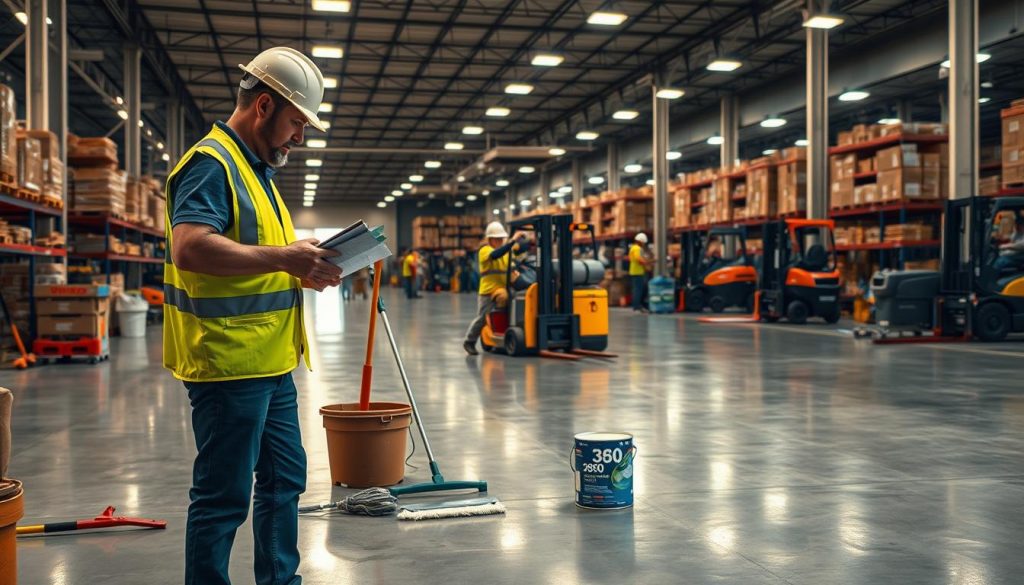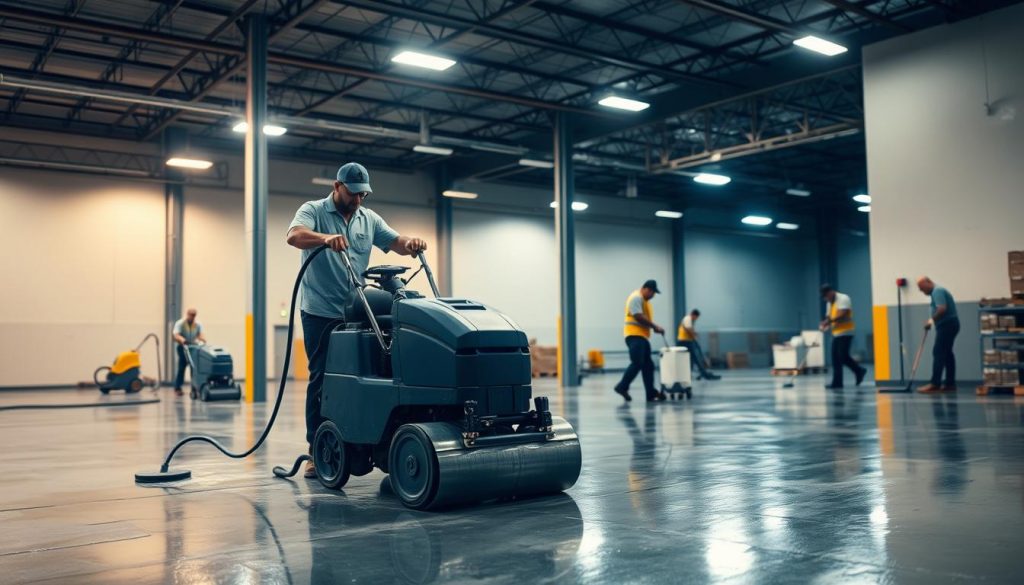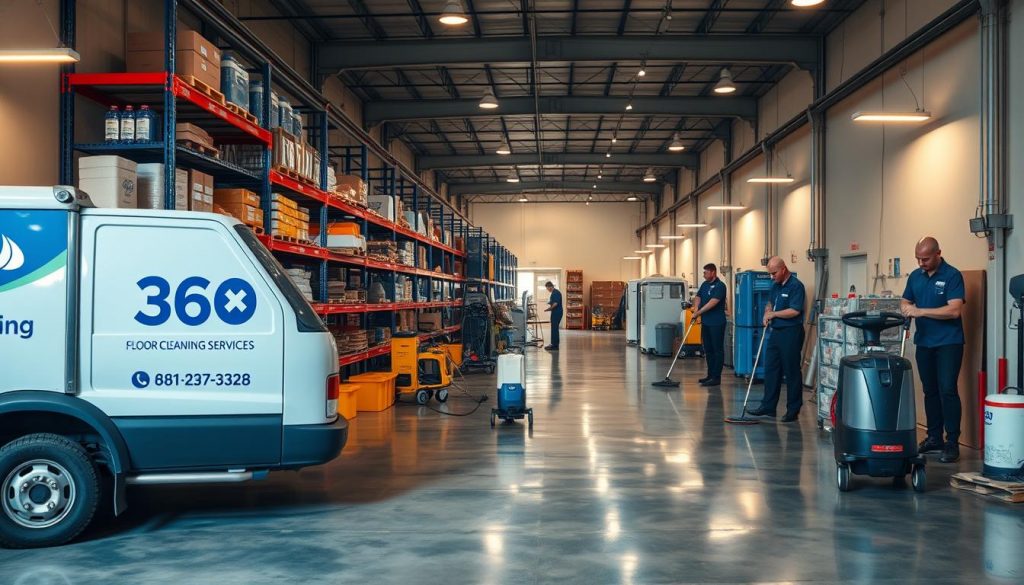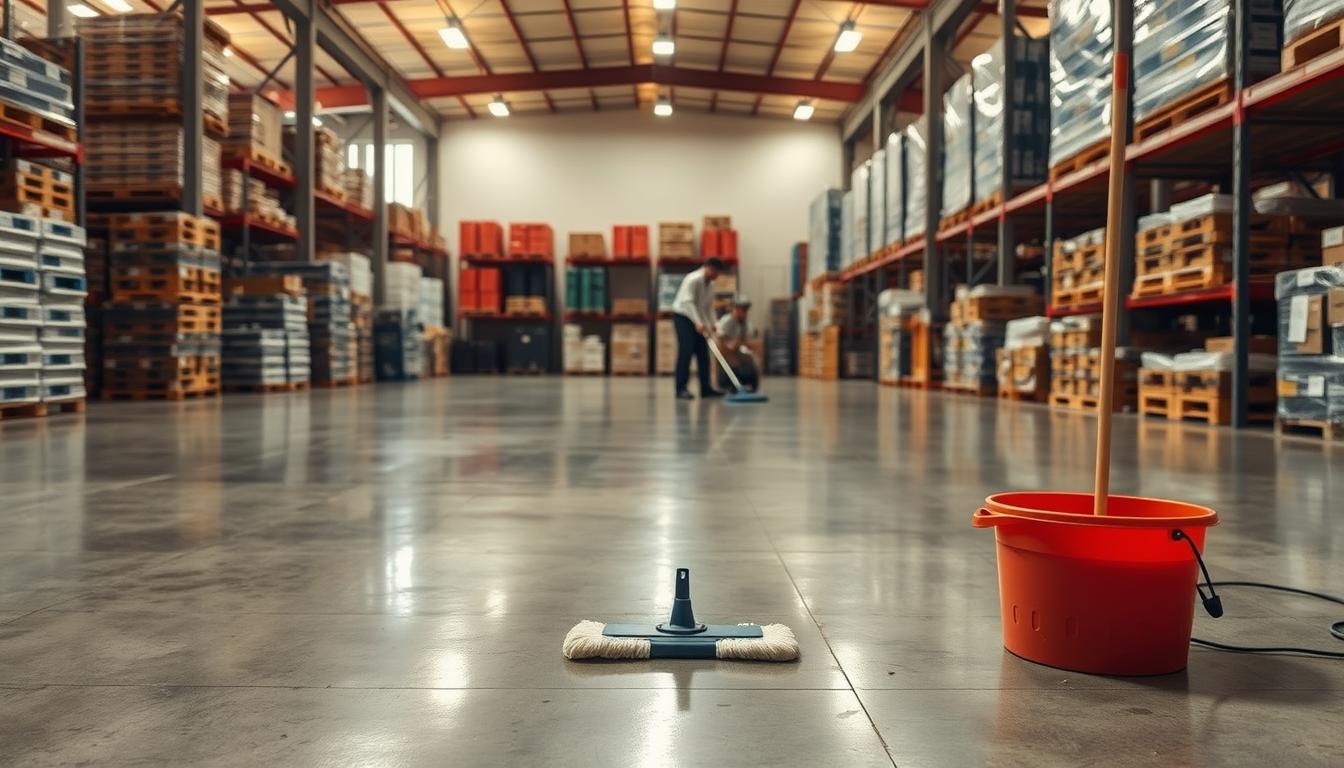How to Prep Your Warehouse Floors for Deep Cleaning in Atlanta
Why Warehouse Floor Cleaning in Atlanta Is a Crucial Business Investment
Atlanta’s growing industrial sector includes warehouses, distribution hubs, and logistics facilities. These environments experience constant foot traffic, forklift movement, and equipment operation. Without consistent cleaning, dirt buildup and grime pose safety risks, slow productivity, and damage surfaces over time. That’s where professional warehouse floor cleaning in Atlanta becomes not just useful — but necessary.
Companies across Metro Atlanta are shifting from basic janitorial services to strategic, results-driven floor maintenance. When industrial floors are properly cleaned and maintained, it extends the lifespan of the surface and supports compliance with OSHA and other safety regulations.
Top Reasons to Schedule Routine Warehouse Floor Cleaning
1. Prevent Slips, Trips, and Falls
Dust, oil, and loose debris are common hazards in busy warehouses. These increase the risk of workplace injuries. By scheduling warehouse floor deep cleaning, facility managers reduce slip incidents dramatically. Atlanta-based floor cleaning services use high-powered scrubbers and degreasers to remove buildup from high-traffic zones.
2. Extend Floor Lifespan
Concrete, epoxy, and sealed surfaces wear out faster when not cleaned. Dirt acts like sandpaper under machinery wheels and pallets. With regular stripping and waxing or pressure washing, your facility protects its flooring investment.
3. Maintain Compliance
Many Atlanta industrial facilities must meet OSHA or FDA guidelines, especially in food production or storage warehouses. Professional cleaning services help maintain those standards through documented cleaning routines and sanitation reports.
Best Methods for Cleaning Warehouse Floors in Atlanta
Heavy-Duty Scrubbing
For grime buildup in tight corners or open areas, industrial ride-on scrubbers are ideal. Atlanta floor cleaning teams often use alkaline or enzymatic solutions followed by power scrubbing machines.
Pressure Washing
This technique removes grease, paint spills, and sticky residue, especially in loading docks or around machinery. Warehouse zones that accumulate oil require hot water pressure washing for full sanitation.
Epoxy or VCT floors benefit from periodic stripping and waxing. This not only boosts shine but provides a protective barrier against future damage.
Dust Control Sweeping
Some Atlanta-based warehouses partner with cleaning crews that specialize in sweeping before shifts start or after hours. This reduces airborne dust and prevents HVAC contamination.
Custom Maintenance Schedules for Atlanta Warehouses
No two warehouses in Atlanta operate the same. Some run 24/7. Others shut down over weekends. That’s why top-rated cleaning companies offer flexible maintenance plans, which may include:
• Nighttime cleanings to avoid workflow disruption
• Weekly or bi-weekly service for high-traffic floors
• Monthly deep cleanings with stripping or degreasing
• Seasonal service to manage Georgia’s humid summer conditions
Smart facility managers build cleaning into their operational calendar to ensure maximum uptime and safety.
Areas Most Affected by Dirty Floors in Warehouses
Loading Zones and Dock Bays
Forklift tire marks, oil spills, and grime can accumulate here fast. These areas should be cleaned weekly, especially in Atlanta’s high-volume distribution hubs.
Breakrooms and Hallways
Although less industrial, these areas impact employee morale. Clean floors reduce odor and prevent bacteria spread from one zone to another.
Cold Storage Areas
Moisture condensation leads to slick floors, which are especially dangerous. Warehouse floor cleaners in Atlanta often use dry vapor cleaning or squeegee vacs to manage this.
Industries in Atlanta That Require Warehouse Floor Cleaning
Warehouse cleaning isn’t a one-size-fits-all solution. Different industries require different methods:
• Food & Beverage Storage – Must meet hygiene and FDA sanitation codes
• E-commerce & Distribution – High volume movement demands slip-free surfaces
• Pharmaceuticals – Requires sterile and dust-free environments
• Manufacturing – Heavy-duty debris and chemical spills are common
• Automotive Parts – Oil stains, grease, and metal filings must be removed routinely
Top cleaning providers offer custom solutions based on your warehouse type.
Green Cleaning Practices in Atlanta Warehouses
Many modern companies in Atlanta prioritize eco-conscious cleaning. Green-certified floor cleaning solutions are now widely used. Benefits include:
• Non-toxic formulas safe for employees and equipment
• Reduced environmental footprint
• Compliance with LEED certification standards
• No harmful residue on warehouse flooring
Look for companies that use biodegradable products, HEPA-filtered machines, and low-VOC floor finishes.
Warehouse Cleaning Service Checklist (Atlanta Edition)
Want to know what to expect from a top-tier warehouse cleaning provider? Here’s a checklist you can use:
✅ Site walkthrough with tailored recommendations
✅ Use of OSHA-compliant, industrial-strength products
✅ Floor scrubbing, degreasing, and stripping options
✅ Pressure washing for warehouse entry points
✅ Scheduled maintenance planning
✅ Reporting and documentation for safety audits
✅ Green cleaning options available
✅ Insured and background-checked staff
✅ Emergency cleanup availability
Not all Atlanta floor cleaning services offer the full package, so compare carefully.
Key Questions to Ask Before Hiring a Warehouse Floor Cleaning Company
• Do you specialize in industrial or warehouse facilities?
• What methods do you use for concrete or epoxy-coated floors?
• Can you clean without disrupting daily operations?
• Do you provide a safety and cleaning log?
• What’s your availability for emergency cleanups or spill response?
Asking these will help you narrow down qualified providers and avoid generic janitorial services that don’t meet industrial needs.
Conclusion: Professional Warehouse Floor Cleaning Atlanta Businesses Trust
In a fast-moving city like Atlanta, industrial floor cleaning isn’t optional—it’s a smart business move. Whether you manage a 10,000 sq. ft. warehouse or a full logistics center, maintaining clean, safe, and attractive floors is part of running a successful operation.
By investing in Atlanta-based warehouse floor cleaning services, you’re extending the life of your flooring, protecting your workers, and creating a safer environment that reflects your professionalism.
Did you know that over 95% of workplace slips occur on surfaces contaminated with dirt or debris? Industrial spaces face unique challenges, especially in high-traffic zones where grime builds up faster than standard methods can handle. Proper preparation isn’t just about aesthetics—it’s a safety necessity.
Atlanta’s bustling industrial hubs require specialized strategies to tackle stubborn stains and hidden hazards. 360 Floor Cleaning Services combines local expertise with advanced techniques to ensure surfaces are thoroughly prepped before deep treatments. Their process begins with a detailed assessment to identify problem areas, from oil spills to dust-packed corners.
Effective preparation starts by clearing movable items and sweeping loose particles. This step prevents equipment clogs and ensures even coverage during scrubbing. For heavily soiled zones, pre-treatment solutions break down grease and contaminants, making the main cleaning phase faster and more efficient.
Key Takeaways
- High-traffic areas demand tailored prep work to address rapid dirt accumulation.
- Clearing obstacles ensures thorough access during professional services.
- Pre-treatment dissolves stubborn residues before deep scrubbing begins.
- Surface-specific strategies protect materials like concrete or epoxy coatings.
- Safety protocols minimize disruptions while protecting workers.
Introduction to Warehouse Floor Preparation in Atlanta
Industrial facilities in bustling urban centers demand meticulous preparation to maintain operational efficiency. Atlanta’s mix of humidity and heavy machinery use creates distinct maintenance challenges. 360 Floor Cleaning Services brings six years of localized expertise, crafting strategies that address these unique environmental and operational factors.
Customized approaches start with detailed assessments. Teams map high-traffic zones, material types, and contamination hotspots. This precision ensures treatments match each facility’s layout and usage patterns. As one manager notes: “A one-size-fits-all method risks missing critical areas—thorough analysis prevents costly oversights.”
Timing matters as much as technique. Professionals coordinate with operational schedules to minimize downtime. For example, facilities with round-the-clock activity might phase preparations during shift changes. This balance keeps workflows intact while addressing specific maintenance needs outlined in this comprehensive.
Multi-surface environments add complexity. Epoxy-coated areas need different care than untreated concrete. Local cleaning services combine industry-grade equipment with eco-friendly solutions to protect materials and workers. Their knowledge of Atlanta’s safety regulations ensures compliance during every step.
Clear communication bridges facility goals and execution. Regular updates between crews and managers adapt strategies to evolving priorities. This partnership model turns preparation from a routine task into a value-driven process for long-term facility health.
The Importance of Floor Maintenance for Warehouse Safety
Maintaining clean industrial surfaces isn’t just about appearances—it’s a frontline defense against workplace hazards. Local businesses partnering with specialized maintenance programs see 42% fewer reported incidents annually. These strategies create environments where employees and equipment operate at peak performance.

Improved Workplace Safety and Reduced Accidents
Slip-resistant surfaces become achievable through consistent upkeep. Dust accumulation near machinery sparks 17% of equipment malfunctions in industrial settings. Immediate spill removal and debris control cut trip risks by up to 68%.
Preventive measures extend beyond surface-level results. Regular inspections identify worn areas needing repair before accidents occur. One facility manager noted: “Since implementing scheduled maintenance, our safety audit scores improved by 35% in six months.”
Enhanced Productivity and Operational Efficiency
Workflow bottlenecks disappear when walkways remain clear. Employees complete tasks 22% faster in organized spaces, according to industry studies. Air quality improvements also reduce respiratory-related absences by 19%.
| Maintenance Frequency | Accident Rate | Equipment Lifespan |
|---|---|---|
| Weekly | 0.8 incidents/month | 8.2 years |
| Biweekly | 2.1 incidents/month | 6.5 years |
| Monthly | 4.7 incidents/month | 4.9 years |
Operational costs drop when facilities avoid emergency repairs. Proactive care preserves surface coatings, delaying costly replacements. These benefits compound over time, making maintenance a strategic investment rather than an expense.
Challenges in Cleaning Warehouse Floors and How to Overcome Them
Efficient upkeep in high-traffic zones demands more than routine methods. Constant activity leads to rapid dirt accumulation across surfaces, while varied contaminants require targeted approaches. 360 Floor Cleaning Services combats these issues with industrial-grade strategies tailored to facility demands.

Addressing Persistent Contaminants and Accessibility Issues
Heavy machinery movement creates stubborn grime layers in critical areas. Teams utilize high-pressure scrubbing systems paired with pH-balanced solutions to dissolve oil residues without damaging materials. For elevated surfaces like support beams, telescopic equipment ensures thorough coverage.
Debris management goes beyond sweeping. Specialists categorize contaminants—from metal shavings to food particles—applying appropriate treatments. One project manager explains: “Organic matter needs enzymatic cleaners, while chemical spills require neutralization first.” This precision prevents cross-contamination risks.
Time-sensitive environments benefit from phased cleaning schedules. Services coordinate with shift patterns, tackling sections during natural workflow pauses. This approach minimizes disruptions while meeting post-construction protocols for sensitive zones.
Safety remains paramount during operations. Non-slip additives in cleaning agents maintain traction, while cordless equipment reduces trip hazards. These measures protect workers while maintaining facility productivity—a balance few providers achieve consistently.
Effective warehouse floor cleaning Atlanta Strategies
What separates exceptional facilities from those battling constant grime? Superior care plans combine frequency with precision. 360 Floor Cleaning Services tailors methods to each space’s demands, ensuring surfaces stay functional and safe year-round.

Revitalizing Surfaces Through Advanced Methods
Industrial-grade care begins with three-phase restoration. Teams first remove loose debris using commercial-grade vacuums. Next, eco-friendly solutions break down stubborn residues without harming materials. Finally, rotary machines with diamond-cut brushes extract contaminants from porous surfaces.
“Our multi-stage process removes 98% of pathogens,” notes a project manager. This approach proves vital in food storage areas where sanitation standards are non-negotiable. Specialized tools reach under racks and equipment, eliminating hidden hazards.
Balancing Daily Care With Intensive Treatments
Routine upkeep focuses on immediate threats like spills and loose particles. Daily sweeping and scrubbing solutions maintain baseline cleanliness between deep treatments. Facilities using this dual approach report 40% longer surface lifespan.
Intensive sessions target accumulated grime in high-traffic zones every 90 days. This timing prevents permanent staining while minimizing operational disruptions. Advanced moisture-control systems accelerate drying times, allowing rapid return to full productivity.
Strategic scheduling separates effective programs from basic upkeep. Combining daily attention with periodic revitalization creates environments where safety and efficiency thrive together.
Tailored Cleaning Plans to Meet Unique Facility Needs
Facility managers face a critical dilemma: balancing operational demands with maintenance requirements. 360 Floor Cleaning Services solves this through adaptive strategies that align with each location’s workflow. Their approach recognizes that production schedules and material handling processes vary widely across industries.

Customized Scheduling Around Operational Hours
Peak activity periods determine service timing. Teams analyze shift patterns and delivery cycles to schedule deep treatments during natural lulls. For example, food distribution centers often prioritize post-inventory hours, while manufacturing plants leverage equipment maintenance windows.
This flexibility prevents bottlenecks in high-traffic zones. One logistics coordinator noted: “They transformed our 3 AM receiving bay cleanup into a seamless process—zero impact on daytime operations.”
Specialized Cleaning Solutions for Different Areas
Not all spaces require identical care. Loading docks combat oil stains and tire marks, while storage zones focus on dust control. Administrative areas need quieter methods to avoid disrupting office workflows.
| Facility Zone | Primary Challenge | Solution Used |
|---|---|---|
| Loading Docks | Oil/Grease Buildup | Degreasing Agents |
| Storage Areas | Dust Accumulation | HEPA Vacuum Systems |
| Office Spaces | Quiet Maintenance | Low-Noise Equipment |
Material compatibility guides product selection. Epoxy-coated surfaces receive pH-neutral cleaners, while untreated concrete uses penetrating sealants. Seasonal adjustments address humidity changes—a crucial factor in regional maintenance plans.
Advanced Equipment and Eco-Friendly Cleaning Solutions
Modern industrial maintenance combines cutting-edge technology with sustainable practices to achieve superior results. Specialized tools now address previously inaccessible areas, while green products ensure worker safety and environmental compliance.
Innovative Tools for Hard-to-Reach Surfaces
Robotic scrubbers with 360-degree rotation clean beneath racks and machinery without disassembly. Telescopic extension wands treat surfaces up to 28 feet high, eliminating ladder risks. High-reach vacuum systems remove debris from ventilation ducts and support beams efficiently.
Utilizing Environmentally Safe Products
Biodegradable solutions certified by Green Seal® dissolve grease without toxic fumes. Low-VOC formulas protect air quality while meeting EPA standards. One technician notes: “These plant-based cleaners perform as effectively as traditional chemicals—without the ecological toll.”
This dual approach delivers thorough deep cleaning while supporting corporate sustainability goals. Facilities reduce their environmental footprint without compromising on hygiene standards or operational speed.
How to Prep Your Warehouse Floors for Deep Cleaning in Atlanta
If you operate a warehouse, you already know how crucial floor maintenance is. But to get the best results, you must prep your warehouse floors for deep cleaning in Atlanta with a step-by-step process. Whether you’re managing a distribution center in Marietta, a fulfillment warehouse in Norcross, or an industrial site in Decatur, proper preparation makes all the difference.
Why Preparation Is Key Before Deep Floor Cleaning
Most warehouse floors across metro Atlanta take a beating from daily operations. Forklifts, foot traffic, spills, and dust build up quickly. If you don’t prep your warehouse floors for deep cleaning in Atlanta, the service may be incomplete or ineffective.
Step 1: Clear the Floor of All Obstacles
Before deep cleaning begins, completely remove pallets, inventory, and equipment from the cleaning area. In large hubs like Smyrna or Roswell, this task may require coordination across multiple departments. Still, it’s necessary to prep your warehouse floors for deep cleaning in Atlanta effectively.
Step 2: Pre-Sweep and Remove Debris
Use commercial sweepers or vacuums to remove loose debris, dust, and small materials. This helps your cleaners work efficiently and prevents surface scratches. If your building is near Chamblee or Tucker, where pollen and fine dust enter frequently, sweeping is a must to prep your warehouse floors for deep cleaning in Atlanta.
Step 3: Flag Any Problem Areas
When you prep your warehouse floors for deep cleaning in Atlanta, always inspect for:
• Grease or oil near workstations
• Mold in corners or under racks
• Cracks, chips, or loose tiles
• Drainage issues or standing water
Flag these before your contractor arrives, especially in high-traffic zones near loading docks or break rooms.
Step 4: Schedule Cleaning for Off-Peak Hours
Downtime is expensive, but deep cleaning is vital. To reduce disruption, prep your warehouse floors for deep cleaning in Atlanta during evenings or weekends. Facilities in Downtown Atlanta, Midtown, and Buckhead often operate 24/7, so proper timing is key.
Step 5: Protect Equipment and Sensitive Materials
Cover electronic gear, power stations, and machinery near the floor. Warehouses in East Point or Hapeville close to the airport may also want to seal off open vents or dock doors to avoid outside dust entering while floors are wet.
Step 6: Use Floor Maps and Zone Markings
If you’re working in a large facility in Peachtree Corners or Suwanee, use temporary signage and floor tape to organize the cleaning areas. This not only helps workers avoid wet surfaces but also improves the efficiency of your plan to prep your warehouse floors for deep cleaning in Atlanta.
Step 7: Identify Your Floor Type
Your cleaning method depends on the type of warehouse floor you have. Whether it’s polished concrete, VCT tile, or epoxy, informing your contractor is essential. In Alpharetta or Duluth, many warehouses use coated floors that require specific cleaning agents.
Communicating this early ensures your service provider comes prepared and helps you prep your warehouse floors for deep cleaning in Atlanta without costly delays.
Step 8: Ensure Ventilation and Drainage
A critical yet overlooked step is checking ventilation and drainage. Moisture buildup can lead to mildew and unsafe conditions. Especially in older buildings in College Park or Forest Park, inspect drains and keep air circulation flowing.
This not only helps your team prep your warehouse floors for deep cleaning in Atlanta but also shortens drying time afterward.
Step 9: Align with Health and Safety Guidelines
Cleaning a warehouse isn’t just cosmetic—it protects your team. By taking the time to prep your warehouse floors for deep cleaning in Atlanta, you’re also improving slip resistance, hygiene, and OSHA compliance.
Warehouses in South Atlanta, Lithonia, and Stonecrest handling medical supplies or perishables should pay special attention to chemical safety and product isolation.
Step 10: Plan for Preventive Maintenance Post-Cleaning
After the job is done, keep your floors in top shape with a routine plan:
• Weekly dust mopping
• Monthly auto-scrubbing
• Spill response training
• Entryway mat replacement
Facilities near Grant Park or Brookhaven, where foot traffic can introduce external dirt, benefit greatly from routine upkeep. Your commitment to prep your warehouse floors for deep cleaning in Atlanta should continue beyond the initial service.
To get the most value out of your investment, prep your warehouse floors for deep cleaning in Atlanta with a clear, organized process. From Sandy Springs to Fulton Industrial Blvd, every warehouse manager should follow a standard prep checklist before calling in professionals.
With the right steps, you won’t just achieve cleaner floors—you’ll create a safer, more efficient workplace for everyone.
FAQ
How does regular maintenance improve safety in industrial facilities?
Consistent upkeep minimizes slip hazards from dirt or debris, reduces accidents caused by uneven surfaces, and ensures machinery operates smoothly. This fosters a safer environment for workers and equipment.
What strategies help manage debris in high-traffic zones?
Implementing daily sweeping, using industrial-grade vacuums, and placing absorbent mats in key areas prevent buildup. For stubborn grime, professional teams employ scrubbing machines and pressure washers.
When should businesses opt for deep cleaning over routine methods?
Deep cleaning is essential for removing ingrained stains, grease, or contaminants that standard methods miss. Facilities with heavy machinery or strict hygiene standards benefit from this approach every 3–6 months.
Can cleaning schedules adapt to 24/7 operational facilities?
Yes. Providers like CleanFreak Atlanta offer after-hours or shift-based plans to avoid disruptions. Custom timing ensures minimal impact on workflow while maintaining cleanliness.
Are eco-friendly products effective for industrial spaces?
Modern green solutions, such as biodegradable degreasers and low-moisture systems, deliver powerful results without harming surfaces or air quality. They meet strict environmental standards while protecting sensitive equipment.
How do professionals handle hard-to-reach surfaces?
Specialized tools like robotic scrubbers, extendable nozzles, and aerial lifts access tight corners or elevated areas. This ensures thorough coverage without risking worker safety.
